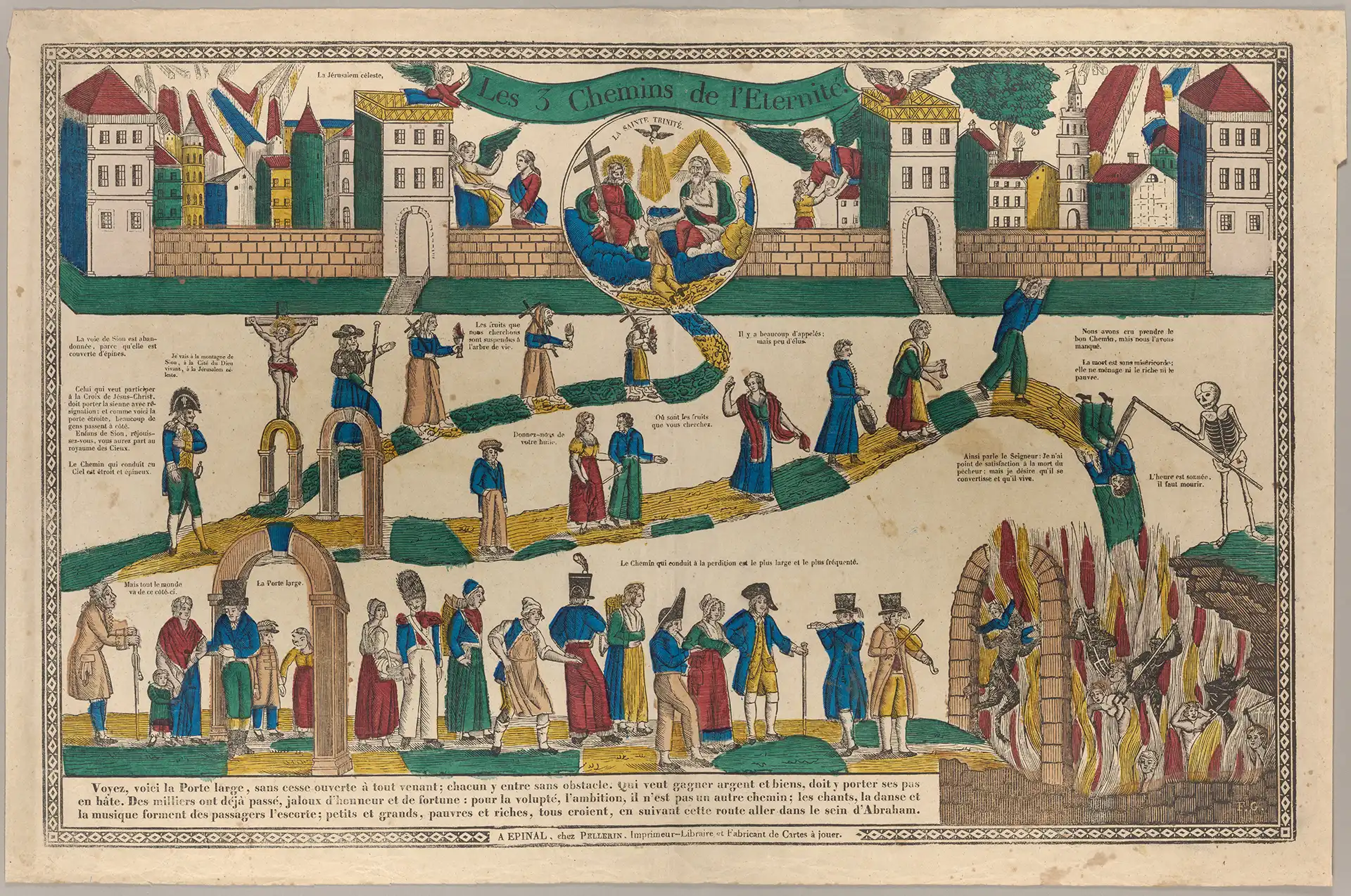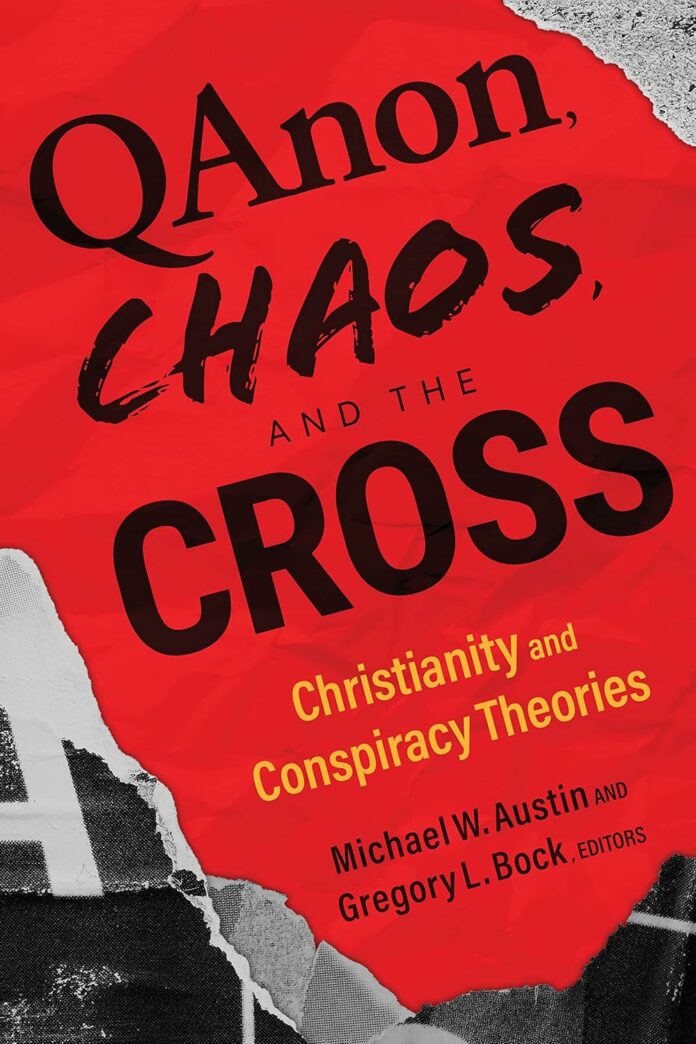In an age of spiritual confusion, eroding trust, and institutional abdication, QAnon, Chaos, and the Cross, edited by Michael W. Austin and Gregory L. Bock, is a timely, if uneven, intervention. This volume gathers predominantly evangelical Christian scholars to examine the entanglement of conspiracy theories, especially, those linked to QAnon, with segments of the American church.
At its best, the book offers a moral vision of Christian epistemology grounded in humility, charity, and a commitment to truth. At its worst, it reproduces the very blind spots and epistemic overreach it seeks to correct, especially in its treatment of COVID-19 and dissenting voices. While the book calls Christians to resist conspiracism and reclaim truth in the person of Christ, it often fails to question the institutional consensus or entertain the possibility that today’s “conspiracy theorists” may be tomorrow’s prophets.
This review focuses on the COVID-19 fiasco not because it is the only topic worthy of theological and philosophical reflection, but because it offers the clearest test case for the collapse of moral and epistemic integrity in secular and ecclesial institutions. If the volume is concerned with conspiratorial thinking, it cannot avoid reckoning with how state power, scientific consensus, and church authority suppressed dissent and demanded obedience, often mirroring the very phenomena it critiques. The pandemic exposed not only the appeal of fringe theories but also the fragility of institutional trust and the theological vacuum that emerged when the Church aligned itself to public health authorities.
The book’s purpose and real strengths
The collection opens with a framing chapter by the editors, titled “Concerns about Conspiracy Theories for Christians.” Austin and Bock warn of the corrosive effects of conspiracy thinking: the breakdown of intellectual virtue, the erosion of public trust, and the distortion of Christian moral witness. QAnon, with its apocalyptic overtones and digital gnosticism (a form of Christian esotericism promising salvation through hidden online knowledge), is treated as an exemplar of how theology can be hijacked by ideological zeal and online mysticism.
The book claims to emphasize epistemic humility and critical reasoning by encouraging intellectual virtue, openness to correction, and the careful weighing of evidence. Epistemic humility is the recognition of the limits of one’s knowledge, accompanied by a willingness to listen, learn, and revise one’s beliefs when warranted. However, this humility is inconsistently applied. While the contributors rightly caution against conspiratorial excesses, they often fail to extend the same critical scrutiny to dominant institutions or dissenting Christian voices. The book follows Thomas Aquinas’s thought throughout. Scripture is not weaponized but consulted for moral realism and theological balance. The political theology offered through Augustine’s vision of the “two cities” and O’Donovan’s “two ages” provides a necessary corrective to politicized theology and eschatological sensationalism.
In this regard, the volume reflects a sincere effort to recover a balanced, intellectually mature, and gospel-centered public witness. The analysis of conspiratorial reasoning as motivated cognition—where emotion, group identity, and fear drive belief more than evidence—is well grounded in both psychology and spiritual formation. The emphasis on character formation, particularly through the cultivation of virtues like open-mindedness, patience, and trust, is a strength of the volume.
COVID-19, institutional power, and the limits of the book’s critique
Despite the volume’s commendable appeal to intellectual humility, it fails to extend this humility to the dominant institutions of our time—those that wielded unprecedented power during the disproportionate response to COVID-19. The book warns against uncritical belief in conspiracies but does not apply the same epistemic scrutiny to governments, public health agencies, media conglomerates, or pharmaceutical giants. In its eagerness to avoid “conspiracism,” it falls into a form of institutional fideism.
This asymmetry becomes especially glaring in light of the detailed critiques found in COVID-19: A Dystopian Delusion.[1] The pandemic response, as documented in that volume, revealed the convergence of biomedical authoritarianism, scientific manipulation, and moral collapse. Institutions imposed mandates, restricted worship, and silenced dissent—justified by a narrative that vilified skepticism.
The COVID fiasco revealed how mass formation psychosis fueled compliance through fear, as VAERS injury data were dismissed and PCR testing—misused despite warnings from its inventor, Kary Mullis—distorted public perception.
The book fails to address how this misuse of PCR testing justified sweeping restrictions. The absence of autopsy programs and the silencing of dissent demand theological scrutiny. Overlooking these realities while condemning only the “fringe” reflects a selective moral posture inconsistent with the Christian intellectual tradition.
Rather than engage these realities, the volume treats any challenge to the COVID narrative as conspiratorial thinking. In doing so, they undermine their own commitment to rational discernment and effectively silence the many Christians—pastors, physicians, scientists, and laypeople—who raised concerns in good faith.
The Church’s complicity in these events is ignored. The Catholic Church, under the leadership of Pope Francis, embraced the biosecurity state, aligning itself with government mandates that violated religious liberty, bodily autonomy, and the sacramental life. Churches closed, denied communion to the unvaccinated, and submitted not to God’s will but to state edicts. Pope Francis himself promoted the mRNA vaccine as an act of love, despite emerging evidence of harm and the unresolved ethical questions surrounding the use of fetal cell lines.[2] Early treatments were demonized,[3] COVID deaths inflated by blurring diagnostic methods, [4] autopsies withheld, and the lab-leak theory prematurely dismissed. Such institutional manipulation corrodes truth, erodes moral authority, and redefines ecclesial allegiance to state power. And yet, the contributors remain silent.
The book clearly misses discussing the worldwide issues of pandemic overreach, like the suppression of opposing views, strict rules from experts, and organized censorship. This omission is not merely analytical; it is theologically revealing—and perhaps strategically convenient. From Canada’s invocation of emergency powers and the freezing of dissident bank accounts to Australia’s internment-style quarantine camps, democratic governments across the West suspended civil liberties in lockstep. The justification, almost liturgical in tone, was “scientific consensus.” But as history shows, consensus is not the same as truth. A generation ago, consensus also defended eugenics, institutionalized racism, and sterilization programs. The Church should know this.
Yet the contributors do not probe this institutional power structure. They do not ask how the same spirit that animates fringe conspiracism may also drive elite propaganda, clothed in the language of “public health” or “global security.” A theology unwilling to challenge both extremes risks legitimizing the very powers it should resist.
One may ask: where were the Bonhoeffers and Solzhenitsyns, the voices crying in the wilderness against a system that demanded moral submission in exchange for temporary health safety? Instead, the book targets fringe actors, ignoring how institutional allegiances might blind it to spiritual realities.
Moreover, an unmistakable American provincialism burdens the book. Though it addresses significant American issues, the book’s lack of geopolitical awareness makes it incomplete. Worldwide, governments used the pandemic to suppress worship, restrict movement, and expand surveillance—a paradigm shift in the citizen-state-sacred relationship. A book that seeks to address conspiracism in Christian thought must also engage with global technocracy, central bank digital currencies, transnational censorship regimes, and the ambitions of the World Economic Forum. That it does not suggests a lack of theological and philosophical prudence.
Eschatology, the Principalities, and discernment in an Age of Elite Capture
One of the more theologically sensitive sections of the book addresses the eschatological framework co-opted by QAnon adherents—the language of “awakening,” “judgment,” “deliverance,” and the eventual exposure of evil. The authors argue that these motifs distort Christian eschatology into a secularized narrative of triumphalism and insider revelation. They rightly caution that such frameworks can prioritize hidden knowledge over truth and foster pride.
However, while they are quick to criticize these distortions, the contributors miss an important point: a well-formed understanding of eschatology, based on Scripture and tradition, actually supports the Church’s message rather than threatens it. Biblical eschatology, as found in the prophets, Christ’s apocalyptic teachings (for example, Matthew 24), and the Revelation to John, does not hesitate to name evil systems, oppressive powers, and the enduring mystery of iniquity within history. Scripture consistently portrays evil not only as personal but also as structural and systemic, often concealed beneath a cloak of legitimacy (see Isaiah 10:1–2; Daniel 7; Revelation 13). Paul’s warning in Ephesians 6:12 reminds believers that spiritual warfare extends beyond the interior life; it has political, cultural, and social dimensions involving principalities, powers, and rulers of darkness.
The authors rightly draw on Augustine’s City of God to caution against simplistic “us versus them” divisions, highlighting the moral entanglement of the two cities within every community. However, Augustine does not dismiss the reality that concrete, organized forms of evil can arise at specific moments in history. His refusal to read the sack of Rome as definitive divine judgment does not negate the possibility of judgment altogether but rather guards against hasty or absolute conclusions. He maintains a distinction that is fundamentally moral and spiritual, permeating every human heart while taking on institutional and societal forms.
Thus, the problem is not that some Christians see evil at work in powerful global systems. The Church has grown too hesitant to speak. In an age of surveillance stakeholder capitalism, corporate collusion with the state (fascism), institutional cover-ups of abuse, and technocratic control justified by “health” and “safety,” it is not paranoia to suspect that the principalities and powers have taken particular institutional forms. It is fidelity.
Eschatology without discernment becomes escapism. But discernment without eschatology becomes institutional complicity. A biblically grounded eschatology requires the people of God to maintain a balance between vigilance and humility, discernment and hope, avoiding theological finality in contingent events and resisting the systemic evil that Scripture calls us to oppose.
QAnon’s narrative of a global elite involved in deception, exploitation, and control may be riddled with falsehoods and exaggerations, but that doesn’t negate the core insight: corruption thrives at the highest levels.
I remain open to the possibility that QAnon is a mixture of truth, half-truth, and falsehood—but the same must be said of the narratives advanced by globalist institutions, media empires, and secular elites. Indeed, if one grants the biblical reality of principalities and powers (Eph. 6:12), then the idea that conspiracies may exist at the highest levels of worldly power is not foreign to Christian thinking—it is integral to it. A faithful response avoids both blind belief and reflexive rejection—it requires discernment. We are called neither to credulity nor to cowardice. In the spirit of Augustine, let us confess with humility what we do not know, affirm with boldness what we do, and remain ever vigilant—not only against error, but against the seductive comfort of consensus.
The widespread psychological compliance during COVID-19 was not merely the result of fear, but of a collective behavioural shift identified by researchers such as Mattias Desmet as mass formation psychosis.[5] This phenomenon demonstrates how entire societies succumb to the influence of irrationality and scapegoating. These are not just sociological; they are spiritual, rooted in idolatry, fear, and soul-seduction. It arises when individuals, after prolonged isolation, anxiety, and a loss of meaning, begin to bond around a shared narrative that explains their suffering and offers moral clarity. In this state, people become susceptible to authoritarian control and resistant to counterevidence.
As documented in COVID-19: A Dystopian Delusion, governments and media promoted a myth of safety centered on compliance and scapegoating, namely, the unvaccinated or dissenters. Such tactics destabilize society and erode spiritual life. Yet this volume does not examine this dynamic, leaving a significant lacuna in its critique of Christian epistemology in the pandemic age. Mass formation psychosis shows why entire populations, including Christians, embraced implausible claims with religious fervour.
The Sociological blind spot: institutional complicity and the Church’s moral failure
While the authors provide compelling observations about echo chambers and social media tribalism, they do not address how institutional Christianity aligned itself with the state. Many Christian scholars mistook loyalty to institutional science for faithfulness to truth.[6] Churches closed their doors, segregated the unvaccinated, and complied with mandates that subverted religious conscience and the sacraments. The Catholic Church’s complicity, especially under Pope Francis, marked a profound moral failure.
This alignment with power was not just a theological failure—it exposed the Church’s lack of both resistance and courage.
The misuse of the “conspiracy theory” label and the dangers of consensus
One of the conceptual errors embedded throughout the volume is its use of the term “conspiracy theory” as a catch-all for unpopular or subversive beliefs. History demonstrates the confirmation of many ideas once dismissed as conspiracy theories. The Epstein-Maxwell scandal, which exposed elite sexual trafficking networks and institutional cover-ups, stands as a clear example. Verified photographic evidence places influential figures, including Hollywood celebrities, financial magnates, royalty, presidents, and prominent philanthropists—within Epstein’s circle. Although Maxwell has been convicted, no client has yet been publicly identified or prosecuted. At the same time, the recent charges and detention of music mogul Sean “Diddy” Combs illustrate how high-level abuse often remains hidden until undeniable. Among the most reprehensible aspects of these circles is the exploitation of minors, a moral abomination explicitly condemned in the Old Testament (see Leviticus 18:21–30). That such corruption persists, not at society’s margins but within its most powerful institutions, is a scandal demanding judgment. To investigate these networks is not to chase fantasies but to uphold justice and truth, both of which Scripture requires believers to pursue (Proverbs 21:15).

Conclusion: discernment, courage, and the task of the Church
This volume is written in good faith. Its contributors sincerely aim to protect the Church from spiritual error, intellectual vice, and public scandal. For this effort, they deserve genuine commendation. However, we must never apply truth selectively. The same moral courage that exposes conspiratorial thinking must also challenge institutional consensus when that consensus becomes coercive.
Over time, the critiques presented in COVID-19: A Dystopian Delusion and related works have gained increasing credibility. The dominant narrative has steadily crumbled over time, as questions about the virus’s origin, evidence of censorship, manipulation of data, and vaccine-related harm have emerged in full force. Those who warned, resisted, and even suffered or died for the sake of truth should not be dismissed as conspiracy theorists; they stand as witnesses.
God’s people should never blindly align themselves with the crowd, the algorithm, or the regime. Our testimony should be that we sought the truth, spoke it plainly, and accepted its cost with unwavering courage (see Exodus 23:2; Zechariah 8:16; Matthew 7:13). For the Spirit given to us is not one of fear, but of power, love, and sound judgment (2 Timothy 1:7).
If the past few years have taught anything, it is that the line between what is called conspiratorial and what is genuinely prophetic often depends on who holds the microphone. The gospel calls for principled vigilance, or nepsis, that tests spirits, institutions, and prevailing ideologies (1 John 4:1; Matthew 10:16; 1 Peter 5:8). Christians are not meant to serve as the culture’s echo chamber or its thought police; they are called to be its conscience.
This calling demands a renewed moral imagination, one that rejects the seductions of prestige, institutional comfort, and elite approval. Evil does its most enduring harm not when it is loud and obvious, but when it appears respectable, concealed within lab coats, policy language, and peer-reviewed consensus.
In this post-pandemic era, the true measure of Christian witness will not be how efficiently we dismissed fringe claims, but how faithfully we pursued truth in the face of concentrated power. Such truth-telling may come at a high cost, yet only this commitment can secure the Church’s integrity and prepare the way for a future rooted in faithfulness.
[1] See Scott D. G. Ventureyra, ed. COVID-19: A Dystopian Delusion: Examining the Machinations of Governments, Health Organizations, the Globalist Elites, Big Pharma, Big Tech, and the Legacy Media (Ottawa, Canada: True Freedom Press, 2022).
[2] Scott Ventureyra, “Relinquishing Rights and Freedoms under the Guise of Health & Safety,” Maritain Studies/Études maritainiennes 38 (2022): 29–53, https://scottventureyra.com/relinquinshing-rights-and-freedoms-under-the-guise-of-health-safety/.
[3] Ventureyra, COVID-19: A Dystopian Delusion, 167-175.
[4] Ventureyra, COVID-19: A Dystopian Delusion, 153-154.
[5] Mattias Desmet, The Psychology of Totalitarianism (White River Junction, VT: Chelsea Green Publishing, 2022).
[6] See Scott Ventureyra, “My Response to an Intelligent Design Proponent on COVID,” scottventureyra.com, November 19, 2023, https://scottventureyra.com/my-response-to-an-intelligent-design-proponent-on-covid/.












